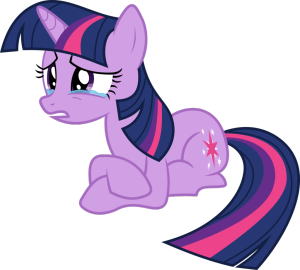 Let’s assume that Twilight did the right thing by eliminating the excess Pinkie Pies. (Yup, I’m continuing this thread) If we grant a few premises, the ones commonly spelled out in these sorts of disaster stories, this is a safe assumption. What, then, is my complaint? If the correct decision was reached and the correct action was taken, can’t we just celebrate that? Do we really have to see the person who did the right thing tortured with self-doubt and regret?
Let’s assume that Twilight did the right thing by eliminating the excess Pinkie Pies. (Yup, I’m continuing this thread) If we grant a few premises, the ones commonly spelled out in these sorts of disaster stories, this is a safe assumption. What, then, is my complaint? If the correct decision was reached and the correct action was taken, can’t we just celebrate that? Do we really have to see the person who did the right thing tortured with self-doubt and regret?
Yes, we do – and not because we’re a sadistic audience. It’s because this is a morality tale – specifically one that examines the morality of killing certain people so that the rest of society may survive. The moral that is taught in these stories is that it is better for one person to die than for everyone to die. However it presumes that the audience already has internalized the “killing people is bad” lesson. The story is about the conflict of two moral desires – the desire to never intentionally kill anyone, and the desire to not allow society to crash and burn.
Alonzo Fife’s explanation of Desirism (the best human-level ethical system I’ve yet found) states that intentional actions are motivated by the desires of the actor, and that the purpose of a society’s moral code is to instill in actors those desires that society deems important. In our society two very strongly promoted desires are those to not kill, and those to prevent social collapse. That’s why the conflict presented in this morality tale is so intriguing. As Eliezer says, as story of Good vs Good is far more interesting than a story of Good vs Evil.
When a character is forced into violating one of those desires to fulfill the other, the level of his/her torment at having to break that rule demonstrates how dearly s/he held it. A character forced to eat vanilla ice cream instead of chocolate in order to save a sibling shouldn’t show any remorse or hesitation. A character forced to kill to do so should be tortured. S/he should have lasting psychological scars, and require therapy. When this happens in real life to good people, suicide sometimes results.
If a character in fiction quickly and without any signs of discomfort resorts to exterminating a large group of people, it means something. Yes, the answer was right in a utilitarian framework, but human characters should have other desires besides simply “maximize utility”. Humans are limited, humans are flawed, and humans are notoriously running on corrupted hardware. Utility Maximization is a morality that is only safe for Gods. It’s good for a human to have reached the right conclusion, but unfortunately that human must feel some remorse if it has the desires it should have. If it doesn’t show remorse that is a sign it does not have the desire to not kill others. It is dangerous, and should not serve as a model for others!
The fact that all of Ponyville was OK with this mass execution means either that their society is deeply corrupt, or that the clones are not people and therefore are not counted in morality. I’ma go on further about that, but this post is long enough as it is, so it’ll have to wait until tomorrow.
The two possible reasons I thought things were ok totally rely on there actually being a magical world on the other side of a pond for the pinkies to actually go live in, or that the other pinkies were about as sentient as a rabbit, perhaps less so even. If neither of these is the case then all of the shock and doom is a correct and proper response. Sending people to other dimensions does actually happen more than once in MLP.